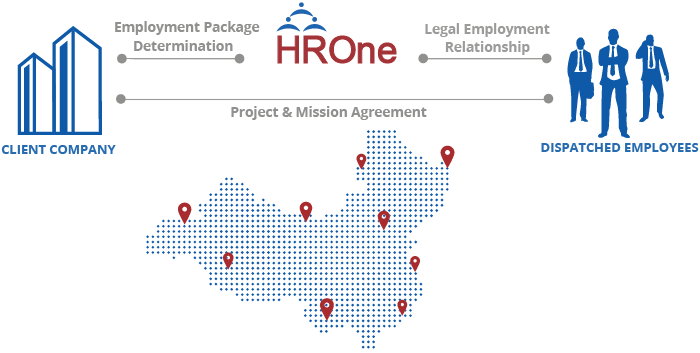Foreign companies interested in entering the Chinese market must consider setting up a sales office in China. This increasingly used strategy gives the opportunity to foster a dedicated sales team on-ground without the need to establish a legal entity in China. In this article, we provide a detailed explanation of all aspects that surrounds the sales office market-entry method in China.


Market Entry Strategies in China
There are several different methods a foreign company can use to penetrate the Chinese market.
- Sales Office – It is an increasingly popular and cost-effective method of entering China. Also known as the Employer of Record model or PEO (Professional Employment Organization). It allows foreign businesses to dispatch or hire employees in China, while a local partner (PEO) manages all HR, administrative and legal requirements. The employees based in China act as a sales office by conducting the overseas company’s sales and networking.
- Representative Office – It is the simplest method of Chinese market entry and is a great strategy for foreign companies to conduct initial market research and marketing activities. However, it is restricted to profit-making activities.
- Wholly Owned Foreign Enterprise (WFOE) – An independent limited liability legal entity that is wholly owned by foreign investors. WFOEs are permitted to conduct business within their registered business scope but can develop their own strategy to make profits in China.
- Equity Joint Venture (EJV) – A limited liability company, with the legal responsibility for operations falling on the company itself. The liability of investors is determined by their total contribution, and investors have the right to the profits according to their contribution.
- Cooperative Joint Venture (CJV) – Also known as a Sino-Foreign Contractual Joint Venture, a CJV enables Chinese and foreign companies to partner, providing different aspects of business operations. Chinese companies will often provide labor, land use rights, and factories, while foreign companies provide the necessary technology, equipment, and capital.
These all have their pros and cons, and making the right choice depends on the company’s goals in China. To learn more about the differences between them, read more in our other article.
Representative Office vs Sales Office
If you are considering a Sales Office, you are likely considering a Representative Office as well. To put it simply, a Representative Office is the lowest level of market entry. Companies typically use this structure to do research, initially market their product, and determine if moving forwards into the Chinese market is a viable option. There are several advantages to using this structure:
- Developing a network of contacts, which is essential to being successful in China;
- Learning about the Chinese market in a financially low-commitment way;
- Determining what kind of advertising is most effective;
- Renting residential and commercial property for future use by the company;
- Engaging in other types of activities that are not profit-generating.
Limitations of Representative Offices in China
However, there are many limitations to functioning through a Representative Office. One is that a foreign company under this structure is legally prohibited from invoicing customers. Not only that, but they also cannot sign contracts. They are subject to a variety of taxes which depend on the city and the business plan, so understanding how to legally operate under this structure can be difficult.
A Representative Office is subject to higher taxation than a Sales Office and is taxed based on the expenses for maintaining the office. A Representative Office is also prohibited from hiring Chinese employees, and it may only employ a limited number of foreigners.
In addition, if the Representative Office proves that the company’s business plan is viable and they wish to proceed to a fully-operating WFOE or JV, the firm cannot just pay the government some fees and switch the model. Instead, they must completely shut down the Representative Office and go through the process of setting up a new entity, which can take at least 4 months. This is frustrating if a company finds its business plan to be extremely strong and wishes to start generating profit immediately but is held up by administrative procedures. Because of these downsides, and especially the risk of getting stuck moving forwards, opening a Representative Office in China is not recommended anymore.
Why Use a Sales Office in China?
A Sales Office differs from a Representative Office in several ways. The initial requirement is that a foreign company physically have an employee presence in China. Having this physical presence enables legal use of the next step, using an HR Agency (PEO) based in China to outsource legal and administrative management. Using an HR Agency such as HROne frees up foreign companies to pursue the main task of doing business in China, leaving payroll, taxation, obtaining government permits, and legal requirements to a dedicated, multi-lingual team. Contact us today to learn more!
Strengths of a Sales Office
Under the structure of a Sales Office, a foreign company is capable of invoicing clients through the local PEO. However, in most cases, foreign companies tend to invoice their clients overseas. A sales office has lower setup risks and time constraints than the longer process of the Rep. office, WFOE or JV entities.
Regarding the requirements to legally hire your employees in China, in the sales office model everything is taken care of through the local partner (PEO in China), ensuring that your company is fully compliant to operate in the market.


The main legal requirement for companies is that they must higher at least one representative/employee in China from their company, companies who use this strategy are typically trying to penetrate the Chinese market in the quickest, most efficient method possible. To fulfill that requirement, companies often choose to hire a natively Chinese employee who is familiar with Chinese business customs and fluent in Mandarin, to expedite the process. The setup time for a Sales Office is typically only 1 week for Chinese nationals and 1-2 months for foreigners, due to the immigration/visa process.
How to Use a Sales Office in China?
Many foreign companies may have questions about how their Sales Office in China will operate on a day-to-day basis. First, all freedom of choice regarding suppliers, clients, and company activities will be left up to your own management. Payroll, record keeping, taxation, and other HR-related activities will be left to the local PEO in China. The foreign firm makes use of the Sales Office to build a sales team in China, structured in a legal way with help from the HR firm. The HR firm can also assist the foreign company with talent recruitment.


What HROne can Offer Your Company
There are so many advantages to setting up a sales office in China. Many foreign companies have found that this model enables them to quickly penetrate a market that is fast becoming the world’s largest and is full of consumers eager for outside products and services. Founded in 2005, HROne has nearly 15 years of experience serving foreign companies’ HR needs and would love to partner with your company. Whether you choose a Representative Office, a Sales Office, a WFOE, or a JV, get in touch with us to hear more about how our multi-lingual team of professionals can help your company.
Get the guide to hire employees in China in 2021 and stay updated on the latest news about HR, employment, and business expansion in China!
Thank you!
You have successfully joined our subscriber list. Check your email to get your copy of the guide to hire employees in China!